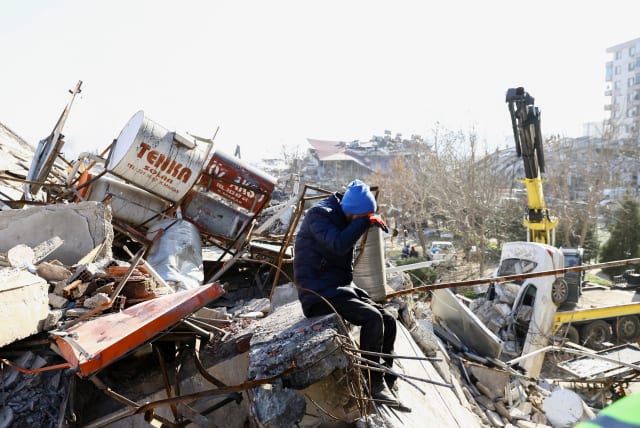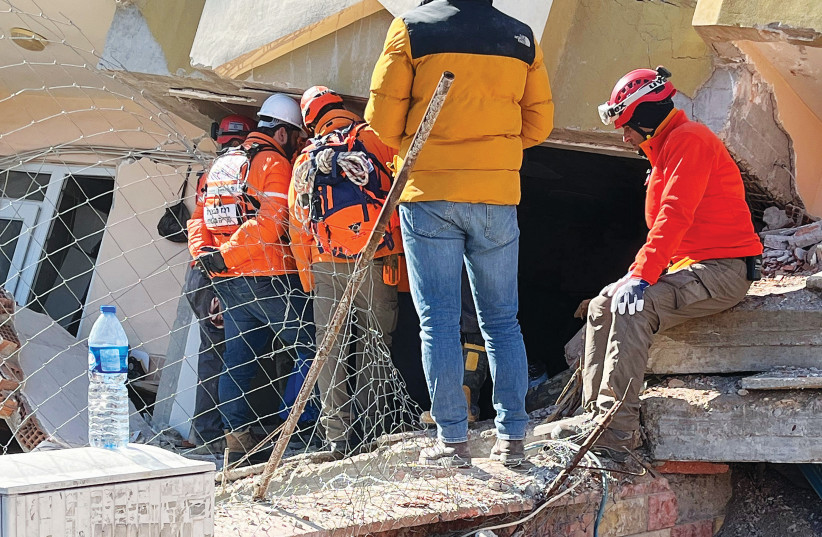Rebel-held areas of Earthquake-hit Syria not receiving international aid

The Assad regime is using the situation to pressure for sanctions relief in exchange for allowing aid to arrive in areas of northwestern Syria.
Following Monday's devastating 7.8-magnitude earthquake with its epicenter in Gaziantep, Turkey, near the Syrian border, and an aftershock almost as strong that hit surrounding areas the same day, Turkey has received large amounts of international aid in many forms. But as Turkey's airports are filled with volunteers from all over the globe, Syria, also hit hard by the quake, is desperate for international aid. But its political situation is blocking the arrival of such aid.
On the Syrian side, the living conditions were rough even before the natural disaster.
"The earthquake may have claimed fewer victims on the Syrian side compared to Turkey; however, people in the area have been living in terrible conditions for years now," Kelly Petillo, program coordinator for Middle East and North Africa at the European Council on Foreign Relations, told The Media Line. "International NGOs reported that Syrians in that area have been displaced up to 20 times," she added.
In addition to being hit by the quake, "the area is the epicenter of the remaining struggle in the almost 12 year-long civil war in Syria and the [President Bashar] Assad regime has been actively trying to deplete it," Petillo continued.
Rebel-held areas
That area is mainly under the control of Syrian rebels who are part of the Sunni Islamist armed and political organization, Hayat Tahrir al-Sham, which is headed by former members of Al-Qaida, she explains. That, combined with the sanctions against the Assad regime and the absence of official diplomatic relations with Damascus, means that the international community must struggle to provide proper humanitarian assistance.
As a result, aid has been sent via the United Nations and international nongovernmental organizations.
"But Russia, backed by China, has been limiting international humanitarian assistance for years, in an attempt to deplete rebel-held areas and redirect aid toward Damascus," Petillo said.
Based in Aleppo, Abdulstaar Kriwi, who describes himself as a human rights activist who fights for freedom and dignity in Syria, says that, despite the statements heard from many countries, until now there has been no significant international humanitarian aid coming into the north of Syria.
Kriwi told The Media Line that the Bab Al Hawa Border Crossing, which currently is under the control of the Syrian rebels, announced that it is prepared to receive humanitarian aid; however, he says: "Aid is currently based on the civil efforts driven by the local population who themselves need assistance and support. The people from areas that were damaged the least are helping others in areas with the most damage."
The Syrian ambassador to the UN, Bassam Sabbagh, asserts that only Assad's government should be responsible for the arrival of all aid into the country, including those areas that are not under its control.
"Now the earthquake has provided Damascus and Moscow with an opportunity to ramp up pressure on the international community to lift sanctions and channel aid through the government in Damascus," Petillo said.
The UN Security Council's approval and agency facilitation of aid would be absolutely necessary to allow for a response of the complexity and scale needed, she suggests. "Local organizations alone would not have enough capacity to deliver aid according to the enormous needs. And local actors themselves have been badly hit by the quake and their capacity to deliver support is even more limited," Petillo added.
That is why European governments are calling on Russia to ensure that Damascus relaxes some of the political restrictions on aid entering northwestern Syria, Petillo says. Aid organizations operating on the ground have asked the international community to ensure that all crossings are opened on an emergency basis, she adds.
Kriwi says that, despite the known death toll in Syria standing at around 1,400 people, the number of victims is likely to rise dramatically because there are hundreds of families and people still under the rubble, whose rescue or recovery mostly depends on international aid.
He adds that the quake has also worsened an already existing humanitarian crisis in the area as a very large number of homes have been destroyed, thousands have been damaged, and many people are now living on the streets and in very difficult conditions.
He explains that the population living in northwestern Syria mainly consists of internally displaced people (IDPs) fleeing from the Assad regime. "These people were living in buildings and were considered to have better resources than the refugee camp residents," he said.
However, Kriwi adds, after the earthquake occurred, thousands of IDPs now need shelter and their living conditions have been significantly impacted. "The cold weather is only making things worse as people lost their homes, possessions, families and friends and are forced to live in the streets," he continued.
Currently, says Petillo, only Russia, Iran, the United Arab Emirates, Algeria and Iraq have sent humanitarian support and rescue teams via airplanes to Syria, "but these landed in government-held areas in Syria," she said, adding that the Syrian Arab Red Crescent says there is no fuel to transport this aid to areas in need because of sanctions.
In theory, she adds, the European and other humanitarian agencies and NGOs should be able to deliver despite sanctions, but they need access. "So, with Damascus pushing for a crossline and the international community for a reopening of crossings, the aid to the northwest remains stuck," she said.
Jerusalem Post Store
`; document.getElementById("linkPremium").innerHTML = cont; var divWithLink = document.getElementById("premium-link"); if (divWithLink !== null && divWithLink !== 'undefined') { divWithLink.style.border = "solid 1px #cb0f3e"; divWithLink.style.textAlign = "center"; divWithLink.style.marginBottom = "15px"; divWithLink.style.marginTop = "15px"; divWithLink.style.width = "100%"; divWithLink.style.backgroundColor = "#122952"; divWithLink.style.color = "#ffffff"; divWithLink.style.lineHeight = "1.5"; } } (function (v, i) { });

